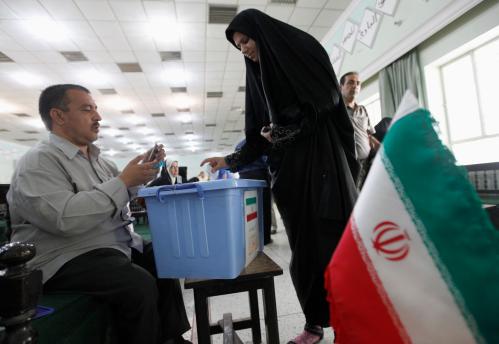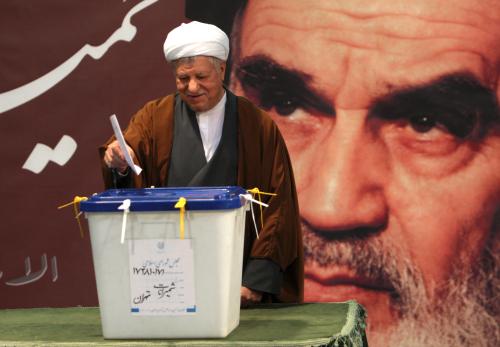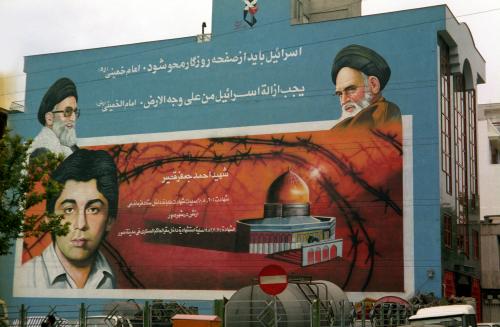Welcome and khosh amadid!
Welcome to Iran @ Saban, a new blog featuring commentary and analysis on the array of issues related to Iran by scholars at the Brookings Institution. It takes only a quick scan of the headlines each day to appreciate the significance of Iran to American national interests and international security, and the variety and complexity of the issues and actors at stake. Through an intense focus on all things Iran, we hope to advance a better understanding of the internal dynamics of the Islamic Republic and promote effective international strategies for dealing with the challenges its policies pose.
We’ve timed our kick-off to coincide with the upcoming Iranian presidential election, in hopes of enriching the discussion that has already emerged around the ballot. As current president Mahmoud Ahmadinejad prepares to leave office, Iran’s internal power struggles will enter a new phase. From now through the vote on June 14th and presumably well beyond, we’ll closely follow the twists and turns of Iran’s frequently unexpected electoral dynamics and consider what the future may bring for Iran. This discussion will delve into the major issues confronting Tehran today, especially the economic crisis and the impact of sanctions.
Although the electoral interplay will consume a great deal of attention in the next few weeks, the focus of the blog will extend well beyond the events of the election and Iran’s domestic dramas. We will be tackling Iran’s approach to the region and the world, its relationship with established and emerging powers, and the strategies and tactics of various players, including the United States, toward Tehran. Inevitably, we’ll spend a lot of time examining the nuclear issue, starting with the prospects for revitalizing the stalled negotiations between Tehran and the international community and discussions around alternative approaches if dialogue fails to produce a diplomatic resolution of Iran’s nuclear ambitions. However, the sense of urgency surrounding the nuclear issue has narrowed the American debate on Iran in recent years, problematically in my opinion. For that reason, watch the space for a robust discussion of the range of issues and threats related to Iran, including terrorism, human rights, the peace process and the Syrian civil war, the rise of new regional and global powers, and the impact of technology and changes in energy markets on Iranian politics and the policy options of the international community.
Let me also say a few words about what this blog won’t be: this won’t be a vehicle for lobbying for or against any particular point of view. This blog will be infused with opinions – various and variegated – but in keeping with the Brookings’ mission, our discussions here on the blog will remain grounded in the ideals of intellectual objectivity, rigorous policy-relevant analysis, and civil debate. In that respect, we hope to integrate some of our longer form scholarship into the blog, by featuring previews of forthcoming publications related to Iran and initating conversations surrounding our ongoing research projects.
I also want to underscore that this will not be a solo venture. At the outset, my name may recur disproportionately, as the person charged with wrangling the blog’s content and as one of the few scholars who has the luxury of obsessing almost exclusively about Iran. However, Iran invokes a diverse and thorny set of foreign policy issues and concerns, and many of my Brookings scholars are at the forefront of research and writing on areas relevant to the Iranian challenge. We’ll try to draw in experts on a range of different regions, including China, Europe, and India as well as the scholars in our Doha office, and functional areas of expertise, such as energy, intelligence, and nonproliferation, and the site will feature the work of a fantastic team of Brookings staff providing with research and media support. As visitors to this site will soon appreciate, the whole of Brookings’ work on Iran is much greater than the sum of its parts.
I want to close this opening with an overture: we want to extend the debate on Iran beyond the walls of Brookings, and we encourage you to join the conversation via email to [email protected] We’ll also be on Twitter (via, among others, @maloneysuzanne) and engaging through a variety of other media.






Commentary
Welcome to Iran @ Saban
May 20, 2013